Introduction
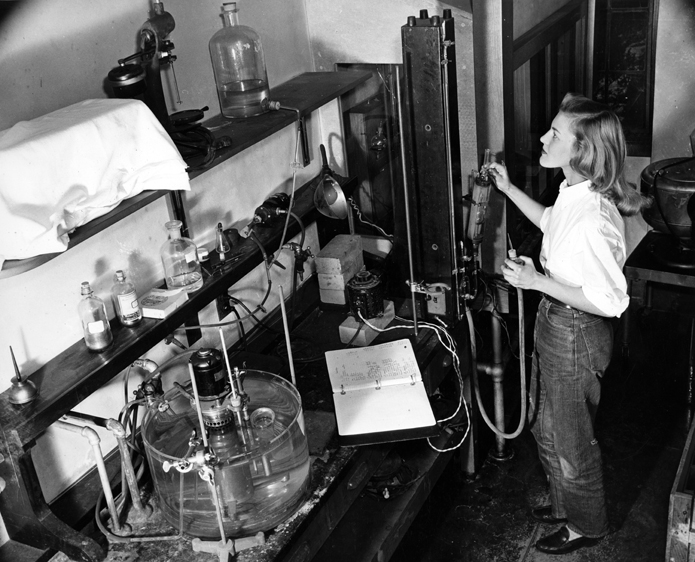
“Maria Goeppert Mayer is a name hardly heard of in high school and college physics classes. She does not appear alongside the 'scientific immortals' such as Einstein and Heisenberg. A preliminary understanding of her research and discovery can shed some light on her anonymity. Maria’s Nobel Prize winning work was in developing the nuclear shell model of atomic nuclei, which is available in a sub-field of physics taught only at the college level. It is unfortunate that a scientist of her calibre has gone unrecognized by the future generation, because her story was one of triumph and perseverance in an age wrought with discriminatory and sexist beliefs.” (Jing Min Chia ’13, “Maria Goeppert Mayer: Revisiting Science at Sarah Lawrence,” Spring 2010)
In 2009, as part of her First Year Studies class in Experiencing Physics with faculty member Scott Calvin, Jing Min Chia ’13, wrote her conference paper on Maria Goeppert Mayer. Maria, a former faculty member at Sarah Lawrence, was the “only woman other than Marie Curie to win a Nobel Prize in Physics.”1 Chia spent many hours in the Sarah Lawrence College Archives and the Columbia University Rare Book and Manuscript Library doing original research culminating in her paper, “Maria Goeppert Mayer: Revisiting Science at Sarah Lawrence” (Spring 2010).
In December 2010, the United States Postal Service issued the Third American Scientists commemorative stamp set, which included Melvin Calvin, Asa Gray, Severo Ochoa, and Maria Goeppert Mayer. Less than a year later, in September 2011, Peter C. Mayer, Maria’s son, released his self-published book, Son of Entropy2. This exhibit looks at Maria Goeppert Mayer’s time at Sarah Lawrence to celebrate the commemorative stamp and recent release of Peter C. Mayer’s memories of his parents. Most of the exhibit text comes from Jing Min Chia’s conference paper and is illustrated with images from the Sarah Lawrence College Archives.
1. Press release from the United States Postal Service, December 28, 2010.
The Sarah Lawrence System
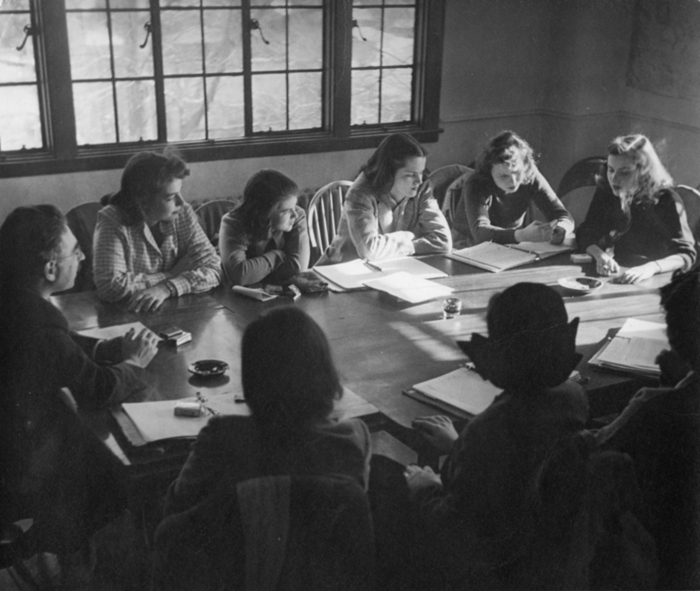
At Sarah Lawrence, “the only demand was don’t do it the way it is done everywhere else. And that I didn’t.”1
Sarah Lawrence’s educational model was taken from the Oxford tutorial system, where students meet with their professors every other week to receive personal tutoring, mentoring or just a general revision of the materials. This applies to every student, regardless of what types of classes are taken. Two types of classes are available to students. First is the seminar, which is a small class of no more than 15 students; the second, a lecture, with a maximum cap of around 45 students. This system allows for a more individualized and personal approach to education, but allows the professor more flexibility in teaching their courses, because consensus is easily sought among a room of 15 students, as compared to 100 in a lecture hall. But because the College’s educational pedagogy is based on the ideas of John Dewey’s progressive education, the Sarah Lawrence student is assumed and expected to be an independent learner.
1.The Reminiscences of Maria Goeppert Mayer (1963), p. 15, in the Columbia Center for Oral History Collection.
Maria Goeppert Mayer
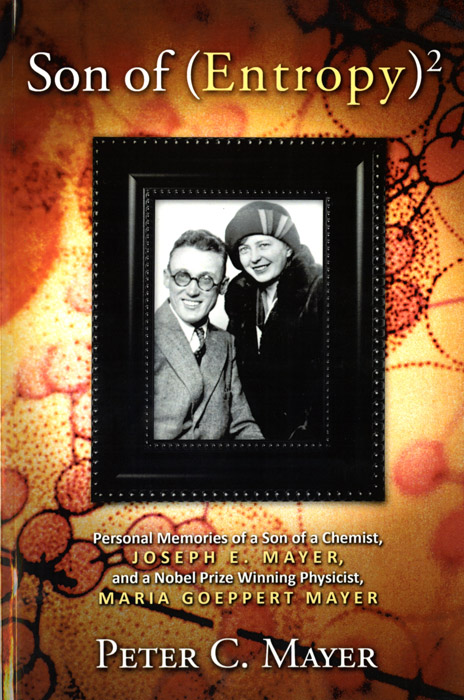
Born on June 28, 1906 in Katowitz, Upper Silesia (Germany; now Poland) to a 6th generation university professor, Maria Goeppert Mayer’s life began as somewhat privileged. Her father was Friedrich Goeppert, a Professor of Pediatrics at Göttingen University. As a child, her father frequently brought her out on walks, and it was on those walks that she developed her intellectual and scientific curiosity1. In the spring of 1924, Maria enrolled in Göttingen University where she took her Ph.D exam in theoretical physics in 1930. While at the university, she met Joseph “Joe” Mayer and they were married in 19302. Joe was soon offered a job at John Hopkins University in Maryland, and in 1930 they left for America. There, Maria was treated as a second-class citizen. Nepotism policies forbade the hiring of both husband and wife in universities. Therefore, although technically employed by the university, she was neither given an office, nor a title, nor a salary. However, Maria was intent on learning more science and speaking to scientists. Her intellect carried her through, and gained her much respect3. In 1939, Joe accepted a tenure track Associate Professor appointment at Columbia University. At Columbia, despite being a woman with intellect and credentials that equalled any professor, Maria encountered a deeply conservative and traditional all-male university. But once again, nepotism policies prevented her from going any further than minor research.
1. Dash, Joan. A Life of One’s Own. New York: Harper & Row Publishers, 1973.
2. Ferry, Joseph, Maria Goeppert Mayer: Physicist. New York: Infobase Publishing, 2003.
3. Dash, Joan. A Life of One’s Own. New York: Harper & Row Publishers, 1973.
Sarah Lawrence: A New Start
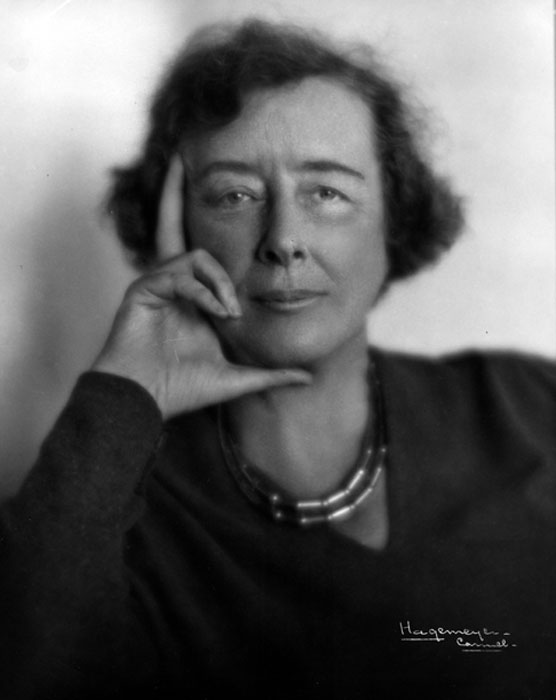
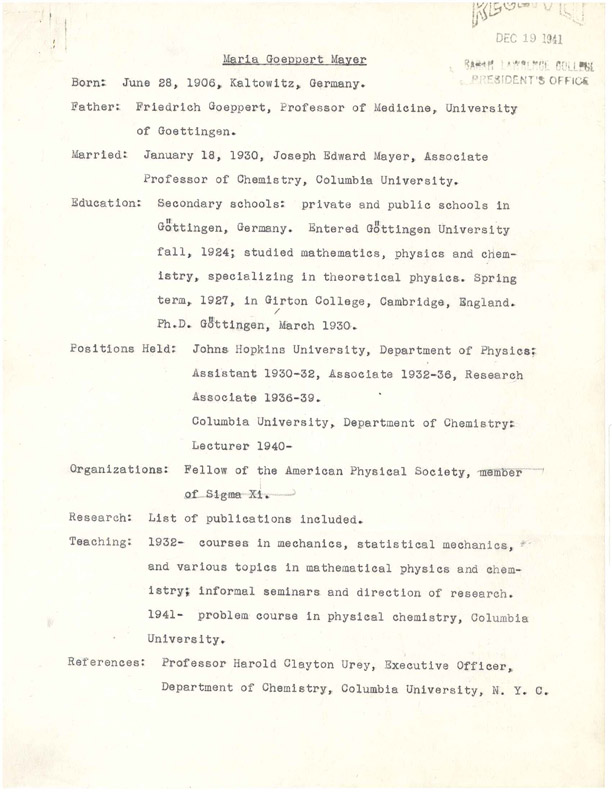
“I said, ‘Alright, I’ll tell you what’s wrong with your teaching in science. After all, science is a part of our culture and you don’t do enough of that and you should give a humdinger of a course in general science which every kid should take.’…And the answer that the President [Constance Warren] made was, ‘Is it more important that these kids should know these high-faluting things than to be able to regulate a flu on a furnace?’ I answered, ‘Do we teach them English so that they can read a cookbook?’”1
Two years later, in 1941, President of Sarah Lawrence, Constance Warren, offered Maria a substitute position teaching mathematics. It was initially to substitute for Mr. Belcher, who had left at the end of the first term. This was her first official paid position, where she was formally recognized as a faculty member. Though the position was only part-time, all efforts were made to ensure she was willing to take on the challenge of teaching undergraduates – something she had never done before. Her appointment was not without concern. During the selection process, her interviewers were primarily concerned about her lack of experience with the methodology of progressive education and undergraduate teaching. However, they considered her more than qualified for the work.
Her broad-based approach to the sciences suited the College well, because the students at that time were more interested in applied mathematics, rather than for the sake of studying pure mathematics. This approach was crucial to the role the College would play in providing a labor force during the war in the form of its students. Apart from that, the College would also undergo changes to adapt to the need for more vocational courses, such as scientific knowledge to work as technicians or as war researchers.
1.Mayer remembers her interview with President Constance Warren, The Reminiscences of Maria Goeppert Mayer (1963), p. 16, in the Columbia Center for Oral History Collection.
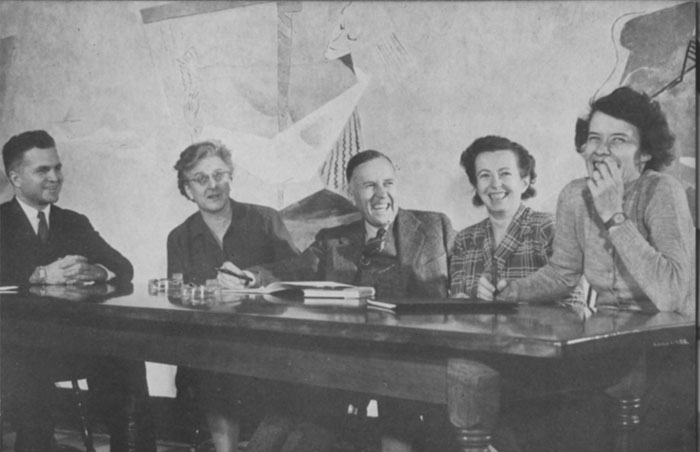
"My mission at Sarah Lawrence was to teach them so that they would be able to read the Science Section of the New York Times."1
What initially began as a part-time substitute position became a long-term commitment. In June 1942, Maria Goeppert Mayer was reappointed to the Science faculty for 3 days a week, paid a salary of $2,100 ($28,000 in present terms – adjusted for inflation)2 and made a don for the 1942-1943 academic year. At this time, she was still giving occasional lectures at Columbia as a ‘Lecturer in Chemistry’3, but took up the offer anyway and went on to teach 4 courses in the new academic year: Introduction to Mathematics, Differential Integral Calculus, Introduction to Physics, and Physical Chemistry with Henry Miller. Although no official class schedules were retained, to teach 4 classes while only on campus 3 days a week was considered a heavy workload – even in present terms. Her interdisciplinary approach led the Committee on Curricular Problems to consider the possibility of allowing science students to take 4 classes instead of the usual 3 to satisfy science requirements. The alternative was the possibility of allowing science students the option of studying science courses as a ‘third’ of their program. This change in emphasis on the sciences set the course for the development of the sciences at the College today, with the establishment of a ‘science third’ in recent years. Nevertheless, an interdisciplinary science course was considered a step towards improving the integration of sciences into the curriculum. Little is known about the extent of her classes, as no syllabi or class schedules were kept from that time. However, knowing the seminar conference system, Maria would most certainly have had to engage with her students every other week.
1. The Reminiscences of Maria Goeppert Mayer (1963), p. 16, in the Columbia Center for Oral History Collection.
2. Bureau of Labour Statistics. “Inflation Calculator”, http://data.bls.gov/cgi-bin/cpicalc.pl (Accessed May 1 2010)
3. Maria Goeppert-Mayer Faculty File, Appointment letters. Rare Book and Manuscript Library, Columbia University in the City of New York.
Sarah Lawrence in Wartime
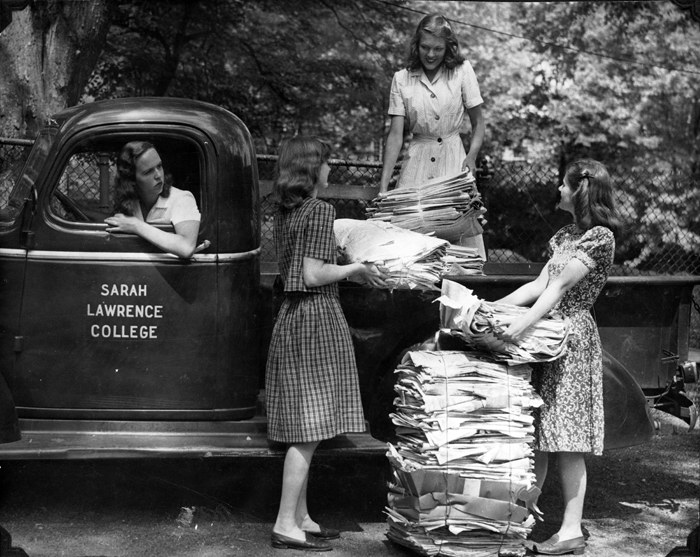
During the war, the college underwent a period of self-evaluation about how to face the new expectations of war. One of the methods used to replace the traditional method – but one that still preserved the principle of the liberal arts – was to teach vocational subjects with specific objectives towards the preservation of the liberal arts. In line with this, Maria’s courses departed from the traditional models of set equations, and were interdisciplinary in nature. In her Differential Calculus Class, she explicitly stated that the purpose of the course was to allow students to apply what they had learned in Physics, Astronomy and Chemistry, three of the emerging sciences of the time. Similarly, her ‘Introduction to Physics’ course dealt with the standards of physics studies: mechanics, heat and sound; but she had stressed the study of physical optics, electricity, radioactivity and transmutation of elements. The introduction of the transmutation of elements suggested that she already had a hunch about what the next obsession of the world of physics would be: Nuclear physics. The combination of elements from chemistry and real-life problems concerning physics was fitting as she also taught a joint course in Physical Chemistry with Miller. Together, they taught what would develop into Maria’s Fundamental Science course, by combining physics, math and chemistry in a course that would serve more practical uses to students.
The Atomic Bomb
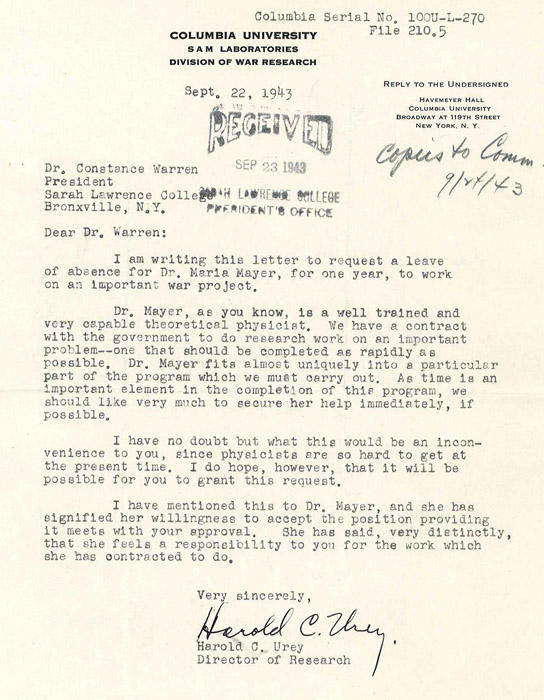
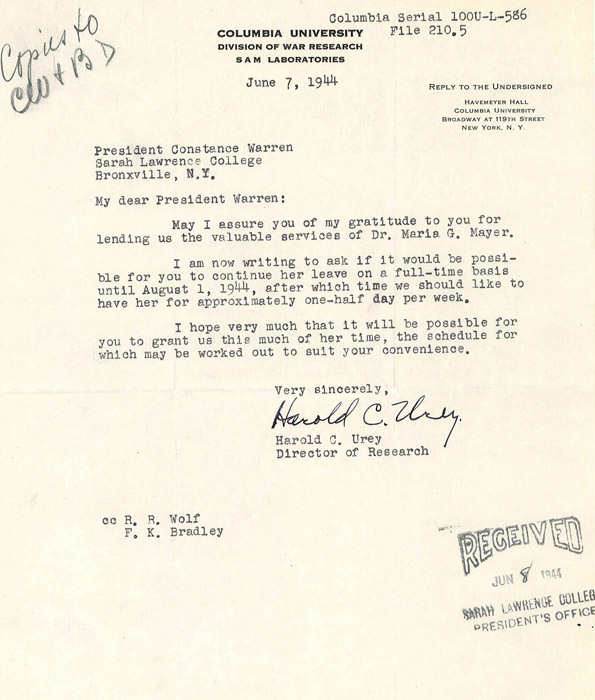
“I taught them a lot of nuclear physics but I never mentioned uranium…I couldn’t. But a number of them discovered it and said, ‘Why don’t you talk about it?’ I said, ‘I know nothing about it.’ They said, ‘Oh, you aren’t allowed to, you are working on it.’ I said, ‘No, I just don’t know anything about it.’…And…after the bomb fell, they said they knew, they had known, and they gave lectures to the rest of the class to explain how the atomic bomb worked.”1
In the fall of 1943, Maria was re-appointed to the faculty. She was supposed to teach Introduction to Mathematics, Calculus, Physics, and Physical Chemistry once again with Mr. Miller. However, the Manhattan Project2 had already begun, and Harold Urey requested Maria’s expertise in August. Urey wrote to President Warren requesting Maria leave Sarah Lawrence to work at Columbia’s Substitute Alloys Materials (SAM) Lab to study the separation of uranium isotopes, a crucial piece to understanding and building a nuclear reactor. For this purpose, her knowledge of both physics and chemistry was useful in predicting the effects of uranium isotropy3. Her leave from Sarah Lawrence, although necessary in view of the war, was by no means easy. Maria certainly felt the stark difference between working at all-male, conservative Columbia and the all-female Sarah Lawrence. This was perhaps motivation enough for her to recommend Sarah Lawrence alumna Susan Chanler Herrick4 - who had previously studied physical chemistry with Maria – to work on uranium separation in the Manhattan Project with her.
Maria was on leave from Sarah Lawrence from October 1943 to September 1944. During this time, she was working full time at the SAM Laboratories with Urey and commuted between her home in Leonia, New Jersey, and Columbia in Manhattan. Though she was finally employed full-time to work on scientific research, this period of the war was particularly difficult for her domestic life5. Since 1942, Joe Mayer had been employed to work at the Aberdeen Proving Grounds in Maryland five days a week, where they were developing more sophisticated conventional weapons. It took a particular strain on their home and children, who were taken care of by an English nanny.
1.The Reminiscences of Maria Goeppert Mayer (1963), p. 16, in the Columbia Center for Oral History Collection.
2. Kelly, Cynthia, ed. The Manhattan Project. New York: Black Dog & Leventhal Publishers Inc., 2007.
3. Dash, Joan. A Life of One’s Own. New York: Harper & Row Publishers, 1973.
4. Johnson, Karen E. “Maria Goeppert Mayer: Atoms, molecules and nuclear shells.” Physics Today 86 (1986): 31-9228. Herzenberg, Caroline L; Howes, Ruth H. “Women of the Manhattan Project.” Technology Review (1993): 96-8.
5. Dash, Joan. A Life of One’s Own. New York: Harper & Row Publishers, 1973.
Return to Sarah Lawrence
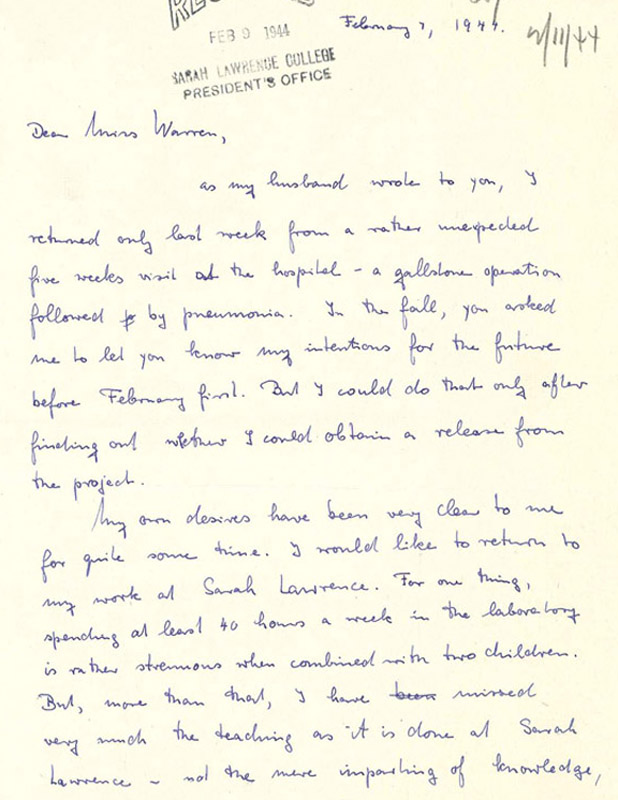
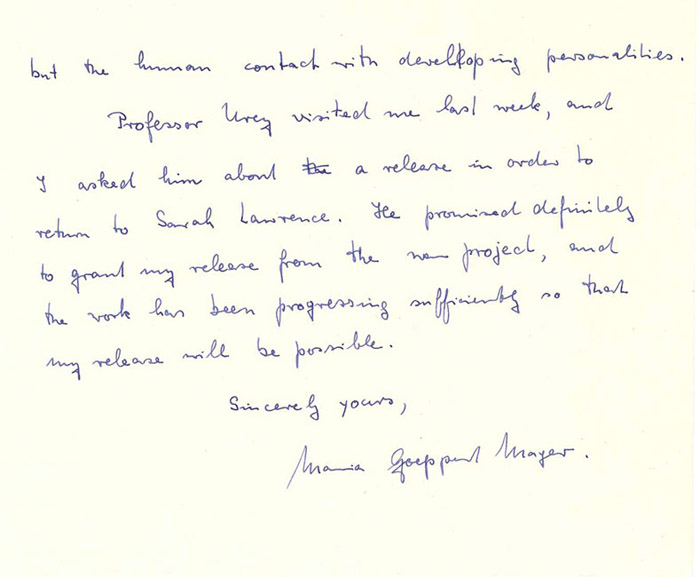
In January 1944, five months into her work at Columbia, Maria wrote a letter to Constance Warren about her uncertainty regarding the end of the war1. By this time, the Manhattan Project was well underway, but they were nowhere close to developing a bomb2. Five days at the lab doing war research was beginning to take its toll and she wrote of her uncertainty of returning to teach at Sarah Lawrence for the 1944-1945 academic year. Even though notes on the margins of her letters sent to the College indicated the necessity of her return, it was unnecessary, as she was determined to return to Sarah Lawrence3 and was willing to ‘fight her draft’ if it were to jeopardize the possibility of her re-appointment at Sarah Lawrence. Maria made it clear that she was accepting the position with Urey at no personal advantage (the pay was the same).
1. Maria Goeppert-Mayer Faculty Files, Joseph E. Mayer to Constance Warren, January 25 1944. Sarah Lawrence College Archives
2. Kelly, Cynthia, ed. The Manhattan Project. New York: Black Dog & Leventhal Publishers Inc., 2007.
3. Ibid.
The Manhattan Project
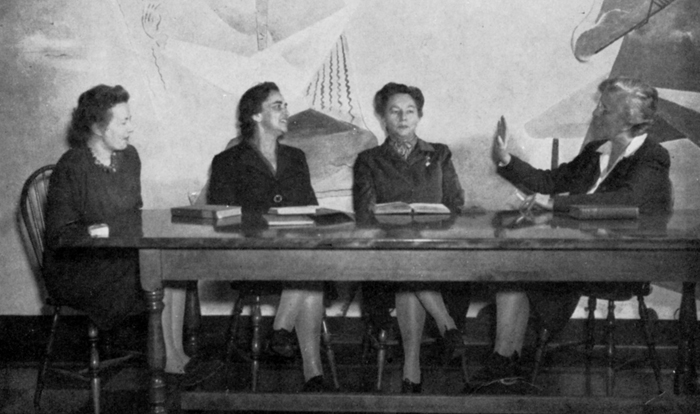
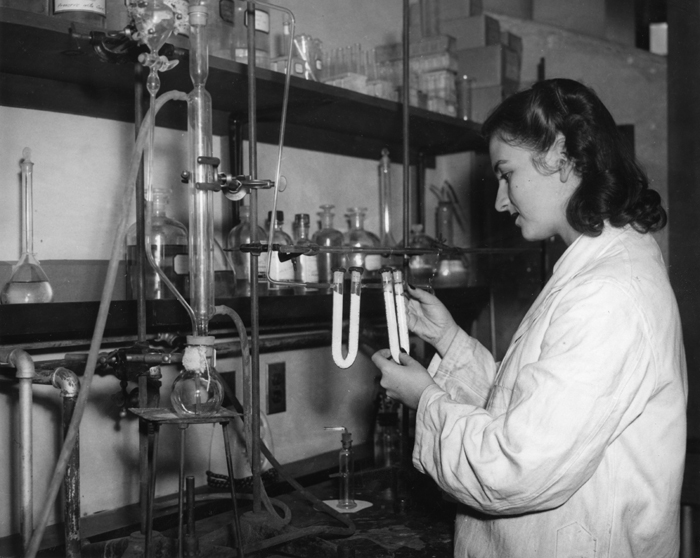
From different sources, it does seem that Maria was wary of the possible ramifications of her work on Germany1. She had previously conducted a seminar on the scientists’ role in the production of weapons of war in 1942 and in a roundtable discussion on a post-war world at Sarah Lawrence, Maria said, “Man’s scientific discoveries and inventions might very likely destroy him"2.
However, her hesitation set her apart from the reactions of her fellow German scientists who emigrated to the US during Hitler’s reign. Many of them were forced to leave and believed that an atomic bomb in Hitler’s hands was much more dangerous than one with the Allies. For Maria, her reluctance to work on the Project was complicated and might have stemmed from her personal background and relationship with Germany. Unlike many of her German counterparts, Maria never had first hand experience with the tyranny of Hitler’s rule3.
Due to the combination of work stress and the responsibility of raising the children in Joe’s absence, Maria suffered a series of illnesses before her return to Sarah Lawrence in the fall of 1944. She had written to Constance Warren about a gall bladder operation, which was followed by a bout of pneumonia. These illnesses had her incapacitated for a while; so much so that Joe wrote a letter sent to Warren on her behalf4.
On April 22 1944, Maria was contracted to return to Sarah Lawrence for the 1944-1945 academic year as a full-time professor. This explained the decision of the administration to make her a don in the past, as they were clearly looking for someone full-time for the long term5. Contrary to most biographies written of her, it was this year (and not 1942) Maria was finally able to teach her ‘unified science course’6. On top of that, she was to teach Physics and Physical Chemistry (again with Henry Miller)7. Her Math course was formally turned over to Ruth Strodt8. Her course description is particularly interesting, because it was drastically different from how the sciences had been described and taught in the past.
“The course presents man’s knowledge of the universe and the atoms, which compose it. It deals, consequently, with subjects, which are basic to the sciences of astronomy, geology, chemistry and physics. Science is treated as a liberal art rather than pre-professional training. The course is, however, prerequisite for further study in either physics or chemistry. The laboratory work contains chemistry and physics as well as observation of stars. No previous preparation in mathematics or science is required.”9
Once again, the distinct lack of information about what exactly she taught is disadvantageous in making the comparison between her course and what is being taught today. However, in a letter to the Committee on Curricular Problems, Maria made it clear that her students had at least read George Gamow’s Mr. Tompkins in Wonderland and The Birth and Death of the Sun10. This was significant, because the practice of reading populist science and science-fiction books still exists today, with a First Year Studies in Physics class reading Richard Feynman’s Surely You’re Joking, Mr. Feynman and Gregory Bernstein’s Timescape.
In August 1944, Maria sent a letter to Constance Warren rejecting Urey’s request to work on more war research for him a day and a half a week, citing her teaching commitments11. This arrangement would have greatly affected her domestic life further, as Joe was still working in Maryland. A final compromise was reached with Maria travelling to Columbia for half a day a week12.
3. Dash, Joan. A Life of One’s Own. New York: Harper & Row Publishers, 1973.
4. Maria Goeppert-Mayer Faculty File, Maria Goeppert-Mayer to Constance Warren, January 25 1944. Sarah Lawrence College Archives.
6. Sachs, Robert. Maria Goeppert-Mayer: A Biographical Memoir. Washington, D.C: The National Academy of Sciences, 1979.
8. Ibid.
10. Curriculum Committee Records, Committee on Curricular Problems, Maria Goeppert-Mayer to Curriculum Committee Records, Committee. February 5 1945. Sarah Lawrence College Archives.
12. Ibid.
Leaving Sarah Lawrence
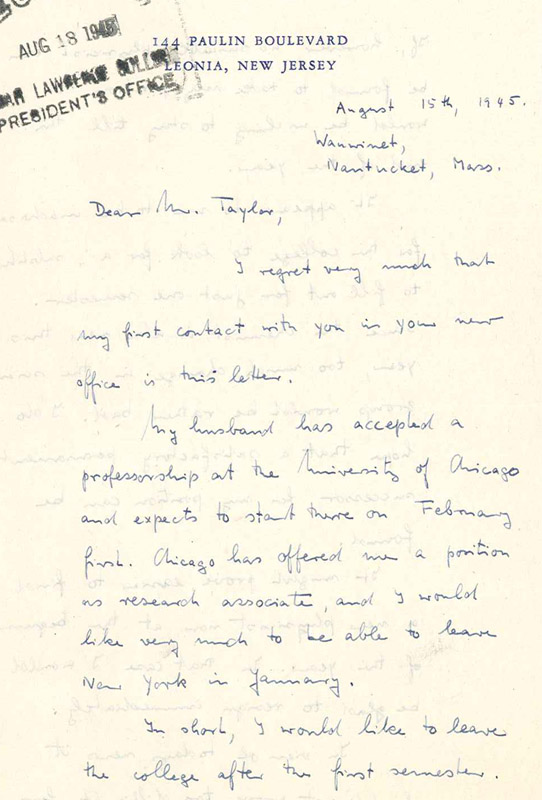
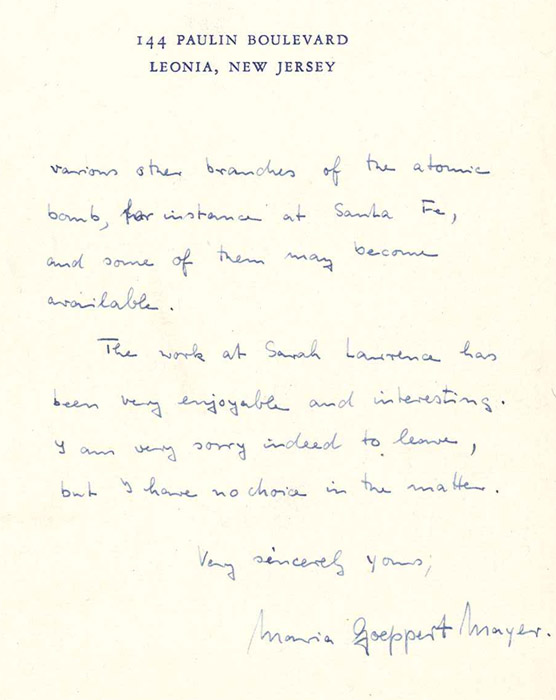
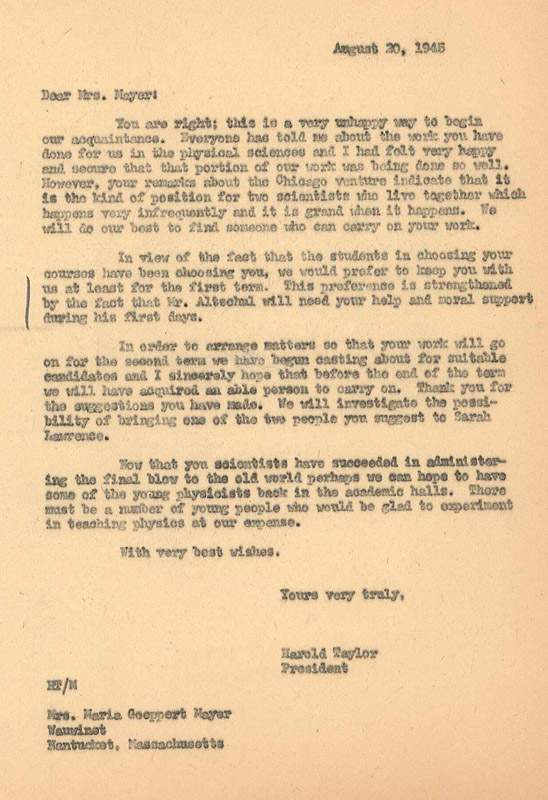
Not long after the bomb was dropped, Maria wrote a formal letter of resignation to Harold Taylor, the new College President. Joe had accepted a full-time professorship at Chicago (to head the Institute of Nuclear Studies1) and Maria followed to join the faculty as an Associate Professor in the Institute – an unpaid position once again. Maria wrote of how she ‘had no choice’ but to follow Joe to Chicago2. She was scheduled to teach the fall of 1945 and was keen on doing so, but was willing to leave prior to September if it would allow the College to adjust to her departure. She finally stayed for the fall semester when Taylor observed that students who had chosen her courses were in actuality choosing her as a professor, a familiar practice even in present times3. She remained for the fall of 1945, and taught Fundamental Physical Science, Physics and Physical Chemistry4. However, there was a change. With her previously secret war research now out in the open, her profile on campus had been raised significantly and students constantly questioned her about the science of the bomb or nuclear physics5. It was a further extension of the application of physics from using it solely for household appliances to work on a much greater scale. Perhaps, to her former students, the inclusion of the transmutation of elements section in their syllabus in 1942 finally made sense.
Maria recommended Charlotte Houtermans to the position6. Maria was released from her contract in October and finally left for Chicago in January 19467. Although there are mentions of her returning to Sarah Lawrence after 1946, no physical documentation in formal channels remains of such visits.
1. Teller, Edward and Judith Shoolery. Memoirs: A Twentieth Century Journey in Science and Politics. Cambridge: Perseus Publishing, 2001. 2. Maria Goeppert-Mayer Faculty File, Maria Goeppert-Mayer to Harold Taylor. August 15 1945. Sarah Lawrence College Archives. 3. Maria Goeppert-Mayer Faculty File, Harold Taylor to Maria Goeppert-Mayer. August 20 1945. Sarah Lawrence College Archives. 4. Sarah Lawrence College Course Catalogues, 1945-1946. Sarah Lawrence College Archives. 5. Mayer, Peter C. Son of Entropy Squared, August 8 2005. 6. Maria Goeppert-Mayer Faculty File, Maria Goeppert-Mayer to Harold Taylor. August 15 1945. Sarah Lawrence College Archives. 7. Maria Goeppert-Mayer Faculty File, Harold Taylor to Maria Goeppert-Mayer. October 22 1945. Sarah Lawrence College Archives.
Legacy
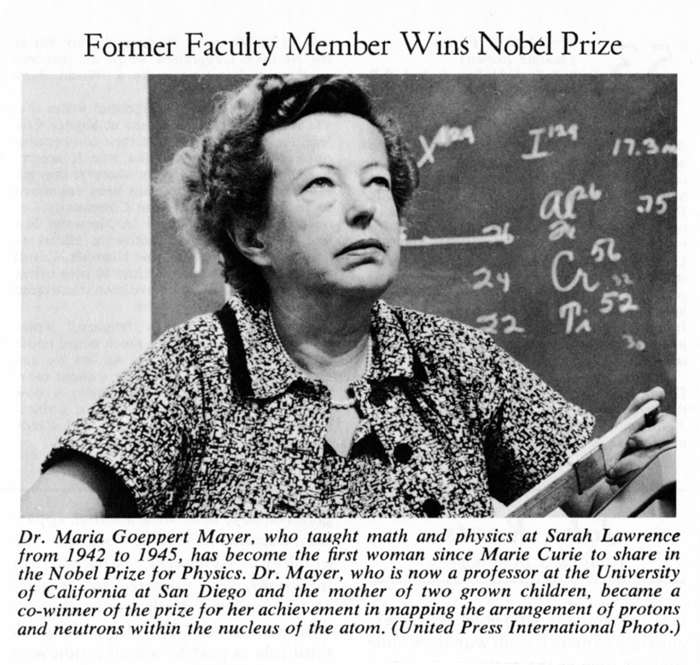
In 1963, Maria Goeppert Mayer became the 4th woman to win the Nobel Prize in Science1 and the 2nd in Physics, after Marie Curie2. She won it for her discovery of the nuclear shell structure. The prize was also jointly awarded to Hans Jensen and Eugene Wigner3. Paul Ward, Sarah Lawrence President at the time, wrote Maria congratulating her. Ward also mentioned the award at a faculty meeting, at which, in response, “There was a spontaneous burst of applause.”
Though generally unrecognized by other biographers, her presence at Sarah Lawrence College changed the course of the sciences here. Although the College had encouraged the study of science during the war (for mostly practical purposes), it needed a scientist like her to transform and create a truly effective interdisciplinary science course. Her classroom experiences encouraged students to transition from learning science for practical purposes to allowing scientific curiosity to lay the foundation of a lifelong journey for knowledge.
Jing Min Chia ends her conference paper by expressing her gratitude to Mayer: “Though her classroom methods were unknown, I am personally indebted to her for providing me the opportunity to approach science in the same manner - the very manner that has allowed me to study her contributions here, and remember it forever.”